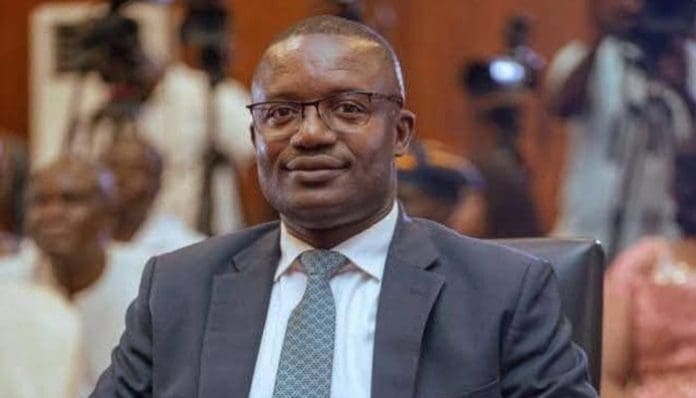Minister of Energy and Green Transition, John Abdulai Jinapor, has donated GHC 50,000 to Yapei United Football Club, continuing his pattern of constituency investments that now spans education, sports, and infrastructure development.
The Yapei Kusawgu MP announced the gesture through a Facebook post, describing it as part of his broader commitment to youth empowerment through sports. The donation comes less than a week after he launched a GHC 1 million education scholarship fund for students in the same constituency.
“I have donated GHC 50,000 to Yapei United Football Club to boost the team’s activities and promote sports development in my beloved Yapei Kusawgu Constituency,” Jinapor shared. He emphasized that sports serve as platforms for growth, unity, and community development.
For Yapei United, the financial injection arrives at a crucial moment. Like many grassroots football clubs across Ghana’s northern regions, the team struggles with limited resources for equipment, training facilities, and player welfare. The GHC 50,000 could address immediate operational needs while signaling broader support for sports infrastructure in the constituency.
Jinapor’s investment reflects a philosophy that’s becoming increasingly common among Ghana’s political class: using sports as a tool for youth engagement and community cohesion. It’s an approach that recognizes football’s unique ability to unite communities and provide opportunities for young people who might otherwise lack structured activities.
“Sports have the power to unite our people and inspire our young ones to aim higher,” the minister noted. “I believe Yapei United can go far with the right support and discipline.” That last word, discipline, hints at the challenges facing many local clubs where talent often exceeds organizational capacity.
The donation fits within what Jinapor has characterized as a comprehensive constituency development strategy. Over recent months, he’s unveiled multiple interventions targeting education, electrification, and now sports. The GHC 1 million scholarship fund launched days earlier will cover tuition fees, learning materials, and other essential costs for brilliant but needy students.
Officials from Yapei United and community members expressed gratitude for the minister’s support, describing it as a demonstration of his commitment to youth development. What remains to be seen is how the club deploys these resources and whether the investment translates into improved performance or better facilities.
Ghana’s grassroots football landscape has long suffered from inadequate funding, poor infrastructure, and limited pathways for talented players to progress to professional levels. Ministerial donations like Jinapor’s address immediate financial gaps but don’t necessarily solve systemic challenges facing local clubs.
The timing is interesting for another reason. As Energy Minister, Jinapor has been engaged in high-level discussions with international investors about Ghana’s oil and gas sector. He’s also overseen rural electrification projects across Central Gonja. Now he’s directing attention and resources toward sports development in his constituency.
Critics of such donations sometimes question whether they represent sustainable development or political patronage. Supporters argue that MPs have a responsibility to channel resources toward their constituencies, particularly in areas like sports that receive limited government funding.
What distinguishes Jinapor’s approach is the breadth of interventions. The scholarship fund, sports donation, and electrification projects suggest a multi-sectoral strategy rather than isolated gestures. Whether this translates into lasting impact depends on implementation and follow-through.
For Yapei United’s players and management, the minister’s challenge is clear: maintain focus and discipline while building on this financial support. That’s easier said than done in an environment where clubs often lack professional management structures and sustainable revenue models.
The donation also raises broader questions about sports development funding in Ghana. Should grassroots clubs rely primarily on political donations, or does the country need more systematic approaches to nurturing local football? The answer likely involves both, with ministerial support complementing rather than replacing institutional funding mechanisms.
Jinapor’s Facebook announcement positions the donation within his vision for youth empowerment, acknowledging that sports can inspire young people to “aim higher.” For many youth in Yapei Kusawgu, football represents more than recreation. It’s a potential pathway to education, employment, or professional careers.
The minister’s series of interventions, from the million-cedi scholarship fund to this sports donation, reflects a political calculation that constituency development matters. In Ghana’s competitive electoral landscape, MPs increasingly recognize that tangible investments in education, sports, and infrastructure influence voter perceptions.
Whether Yapei United can “go far,” as Jinapor hopes, depends on factors beyond this single donation. Sustained investment, professional management, youth development systems, and pathways to higher levels of competition all play crucial roles in club success.
For now, Yapei United has GHC 50,000 and a ministerial endorsement. How the club uses these resources will determine whether this donation becomes a turning point or simply another financial injection that addresses immediate needs without catalyzing fundamental change.
Source: newsghana.com.gh











